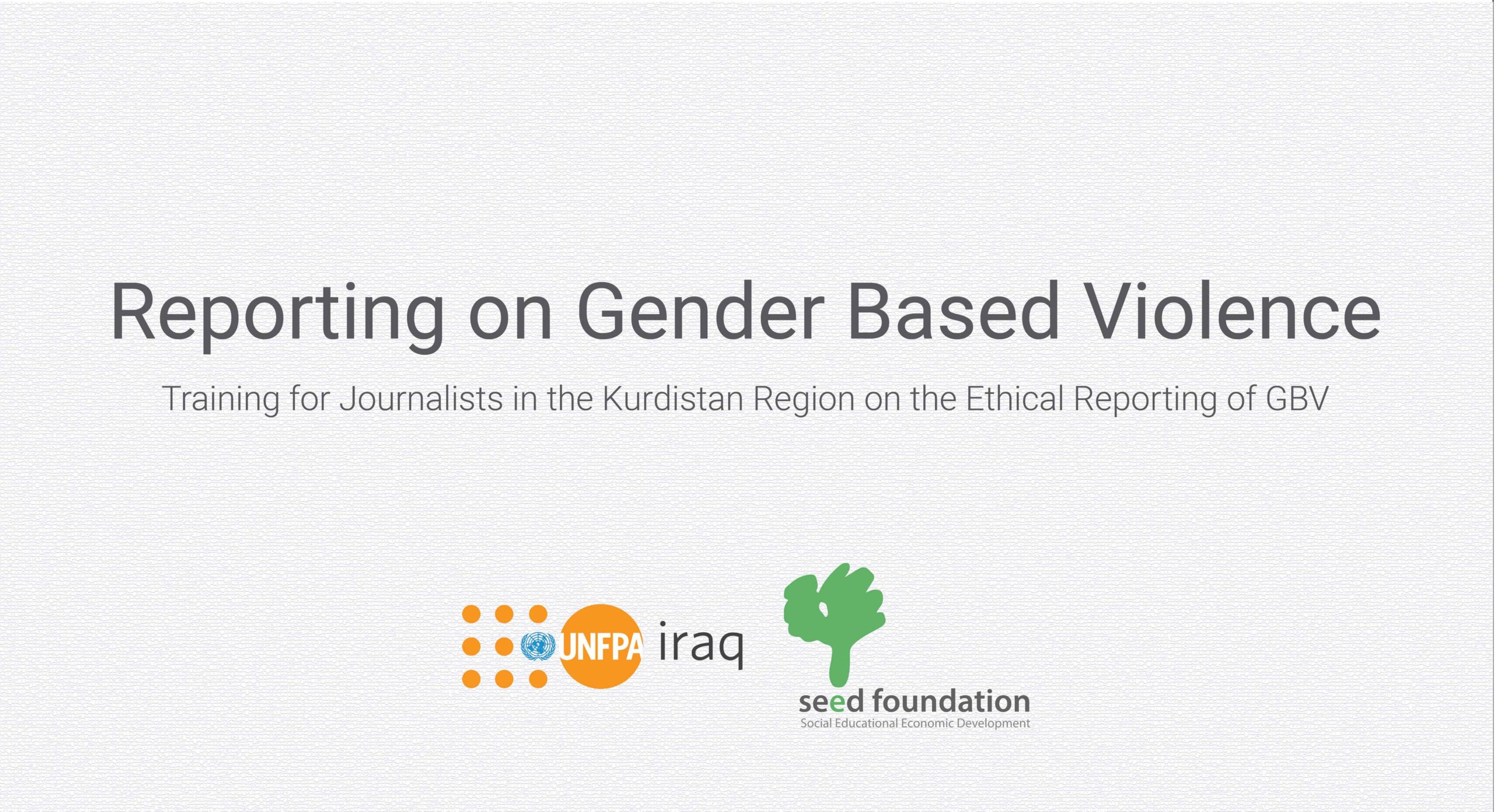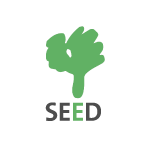
UNFPA, SEED Train 15 Journalists in Kurdish on Reporting GBV amid Crises
Insensitive reporting of gender-based violence (GBV) can put survivors and those at risk in greater danger. Crises, such as the COVID-19 pandemic, can make it more challenging for journalists to report on GBV appropriately. Although good reporting guidelines have been widely available in English and Arabic, there have been limited resources in Kurdish. SEED partnered with the UNFPA in Iraq to translate their guidelines into Sorani Kurdish.
As part of a joint 16 Days initiative with UNFPA Iraq with support from the Government of Canada, SEED used the guidelines to train 15 journalists from across the Kurdistan Region of Iraq in November and December 2020 on the ethical reporting of GBV in their communities. All interactions with the journalists were conducted in Kurdish with full translations of materials, and native speakers as trainers. Similar training has been provided elsewhere in Iraq in Arabic by the UNFPA, but this was the first time the training was offered fully in Kurdish.
Salwa Moussa, the Communications Specialist for the UNFPA in Iraq, emphasized to the participants in her opening remarks the important role professional journalism plays in society. “Journalism is among the most powerful tools for social justice, particularly in the fight against gender-based violence. Journalists have the power to amplify the voices of women and girls, to shed light on the forms of violence that target them, and to help communities address these harmful practices. For this reason, the media must report stories accurately and ethically.”
The United Nations Population Fund (UNFPA) works to ensure that no woman dies while giving birth, no woman suffers from GBV, and each woman has the right of and choice of childbearing. In Iraq, UNFPA partners with the Government of Iraq, the Kurdistan Regional Government (KRG), and the civil society.
The sessions addressed unintentional re-traumatisation of GBV survivors by the media to obtain reports or scoops. “We, as the media, have the responsibility to report correctly and accurately because unfortunately, sometimes without realising it, we can be part of the problem rather than the solution. The principles of survivor-centred journalism and the ‘Do No Harm’ still apply and become more important than ever during health crises,” added Moussa.
The free training sessions, held on November 26 and December 9, 2020, were led by two trainers: SEED Vice President Tanya Gilly Khailany and Media Expert Hiwa Osman. The training was guided by UNFPA’s Guidelines on Reporting on GBV during Crises. Due to ongoing COVID-19 precautions, the sessions were hosted virtually.
“Gender-based violence is still a taboo subject in Kurdish society. It’s important that we talk about it, but as the conversation grows, it’s vital that reporting of the issue is done in an ethical manner to avoid further trauma or stigma to the survivors,” said Gilly Khailany.
The first training session covered UNFPA’s guidelines and tips for reporting GBV ethically. Gilly Khailany stressed the importance of obtaining informed consent from sources when reporting on such sensitive topics. Of central importance, especially during crises, participants were strongly discouraged from interviewing GBV survivors directly — not only to limit the spread of outbreaks, but to avoid retraumatization of the survivor. This is also the same approach SEED’s staff takes when interacting with survivors of varying types of abuse and trauma.
“It is very important that journalists should be aware of the new restrictions imposed by COVID-19 without losing sight of the importance of the principles of gender-based reporting,” Osman said.
Other tips included following official safety guidelines such as government measures at all times, journalists and their outlets being aware of GBV services with anonymous hotlines, but resisting the urge to directly intervene or help a survivor, as a journalist is not qualified to provide such services, but still has a valuable role in ethically reporting GBV cases.
Delving deeper while reporting a story was strongly encouraged so journalists can see the contributing factors to an individual GBV story such as exploring deeper connections between gender, human rights, social justice and other basic concepts or issues which may be surrounding the individual’s story.
“The trainees were engaged and eager to abide by the restrictions and also to highlight the GBV issue as a priority for the society,” said Osman.
The second session challenged participants to apply the concepts they had learned in the first session by examining a variety of real stories from Kurdish media. The value of publishing a story for the sake of just obtaining readership or views started an engaging conversation. The question of “What is journalism?” was discussed enthusiastically.
Hana Shwan Hassan, the GBV Project Manager for the Kurdistan Journalists Syndicate, elaborated on issues discussed and best practices within the Kurdish context. “The use of vocabulary was one of the important topics because the words we sometimes use aren’t gender-balanced nor proper.,” said Hassan, a journalist of more than 20 years.
A consensus was the need for better communication between journalists, media outlets, the government, and civil society organizations (CSOs) with the support of international organizations, so the Kurdistan Region can stay up to date with journalistic standards and best practices.
“CSOs in Kurdistan must continue to provide training courses to journalists as refreshers to stay current on the use of international standards for reporting. Support also should be provided to local organizations which monitor and evaluate the media,” Shwan added.
SEED’s vision is to see a prosperous Kurdistan with equal opportunity and protection of rights for all. The local media’s role in that goal is critical; training sessions and guidelines such as these support the media to do so in a responsible and ethical manner.
Note: Any journalists reporting on issues such as GBV in the Kurdistan Region or Iraq can reach out to media@seedkurdistan.org or smoussa@unfpa.org for inquiries.
